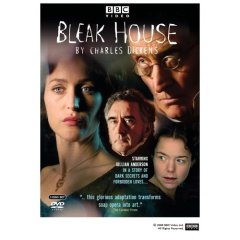Directors: Justin Chadwick & Susanna White
Writing credits: Andrew Davies & Charles Dickens (novel)
Review by Jeanne Doherty, MLIS Day
I grew up on public television. My parents didn’t have a TV when I was very young, but even after they did, us kids were allowed to watch only a very small number of things: ‘The Wizard of Oz’ at Easter, ‘It’s a Wonderful Life’ at Christmas, Sesame Street, the Muppets, Nova and Masterpiece Theater were the only things I recall watching. I loved Masterpiece Theater almost in spite of itself, because—with a few notable exceptions—it was like literature with all the juice sucked out of it. Watching a word-perfect adaptation—one with every costume, bonnet-ribbon, drinking glass, chair and buckle flawlessly recreated to period—that is at the same time absolutely without a discernable pulse, or any discernable passion can be an almost unbearably frustrating experience. If they got the hairdo right, you wonder, and the whiskers, and the shoes, why, oh, why can they not feel what the book is ABOUT, for crying out loud?
Well, thank the merciful heavens for Andrew Davies. He’s actually been writing screen adaptations of books for the BBC since before I was born, and he seems to be getting better all the time. He is currently famous for ‘Bridget Jones’ Diary’ and for the 1995 BBC version of ‘Pride and Prejudice’ starring Colin Firth, but he is also the writer for several of my very favorite BBC productions over the years, including ‘Middlemarch’, ‘Tipping the Velvet’, and now this wondrous, amazing ‘Bleak House.’ He is one of very few literary adapters who are respectful to, but don’t seem at all stifled by the presence of the original work, and he has been blessed with many excellent directors and actors.
In the case of ‘Bleak House,’ which was released on DVD last week, his adaptation managed to acquire the stunning Gillian Anderson, perfectly cast as the coldly mysterious Lady Dedlock, Charles Dance for the role of the cunningly sinister Mr. Tulkinghorn, and wonder of wonders, a young actress named Anna Maxwell Martin, who is able to play one of Dickens’ treacly good-girl characters in such a way that she seems like a real—and profoundly loveable—person. This last is possibly the most unlikely miracle in BBC history. Dickens’ good girls are almost impossibly good, and often without other discernable qualities. The roles don’t leave much for actresses to work with, and frequently reduce them to pretty faces with candy-fluff lines. Not so here. Martin’s Esther Summerson is forthright, always kind, soft-spoken and completely genuine. Her round face, slightly crooked smile, and perfectly clear blue eyes express everything her character feels in the most subtle and heart-wrenching way. You ache for her troubles and rejoice in her good fortune as if she was the best sister you never had. If there weren’t already a thousand excellent reasons to love this ‘Bleak House,’ she would be more than enough all on her own.

Fortunately for her, Martin doesn’t have the slightest need to carry this picture. It does not require a crutch. It has all of those pitch-perfect details that are the signature of a true BBC production, but none of the stiltedness. Davies and the directors juggle the dozens of characters and story lines in a lively and blessedly comprehensible way, and they never lose sight of the emotional consequences of the action. This ‘Bleak House’ has a beating heart, not a metronome, at its center. And, though I must admit that I have never read the book, and therefore was able to be surprised at every turn, I do know that real Dickens fans were just as excited about it as I was. Not being a Dickens fan myself, I am ashamed to admit that I might actually prefer the movie version. The man did like to take the long way around the barn, as they say, and Davies prefers to go straight to the heart of the matter. Yes, I know I’m a philistine, but it’s true.
--Jeanne Doherty
